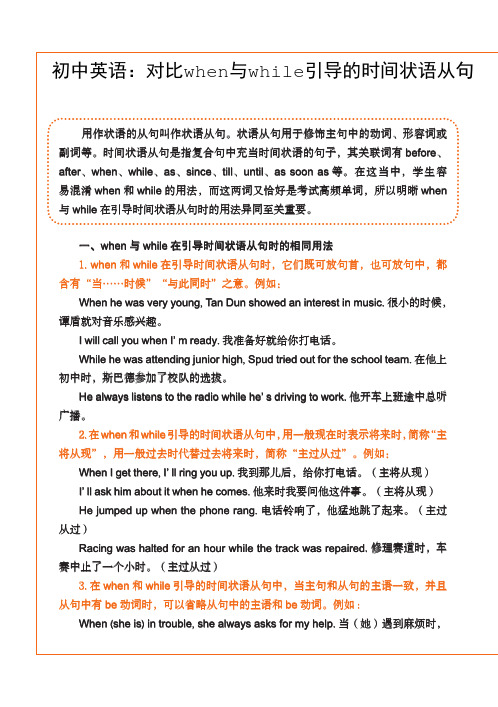[精选]初二when与while时间状语从句--资料
- 格式:ppt
- 大小:124.50 KB
- 文档页数:5


when和while时间状语从句一、when引导的时间状语从句1. 基本用法- when引导的时间状语从句,既可以表示在某一时刻发生的动作,也可以表示在某一时间段内发生的动作。
从句中的动词可以是短暂性动词,也可以是延续性动词。
- 例如:- When I got home, my mother was cooking.(got是短暂性动词,这里表示在我到家这个时刻,妈妈正在做饭)- When we lived in the countryside, we often went fishing.(lived是延续性动词,描述我们住在乡下这个时间段内经常去钓鱼的情况)2. 时态搭配- 当主句是一般将来时,从句常用一般现在时表将来。
- 例如:When he arrives tomorrow, we will have a party.(arrives是一般现在时,主句will have是一般将来时)- 当主句是过去进行时,从句用一般过去时,表示在过去某个动作进行时,另一个动作发生了。
- 例如:I was reading a book when he came in.(was reading是过去进行时,came是一般过去时)3. 位置特点- when引导的时间状语从句可位于主句之前或之后。
当位于主句之前时,从句后常用逗号与主句隔开。
- 例如:When it rains, the ground gets wet.(从句在前)- The birds fly south when winter comes.(从句在后)二、while引导的时间状语从句1. 基本用法- while引导的时间状语从句,从句中的动词必须是延续性动词,表示在某一时间段内,主句和从句的动作同时发生。
- 例如:While I was reading, my sister was watching TV.(reading和watching都是延续性动词,说明我读书和妹妹看电视这两个动作同时进行)2. 时态搭配- 当主句和从句都是过去进行时,表示两个动作在过去某一时间段内同时进行。

when 和while的用法区别①when是at or during the time that, 既指时间点,也可指一段时间;while是during the time that,只指一段时间,因此when引导的时间状语从句中的动词可以是终止性动词,也可以是延续性动词,而while从句中的动词必须是延续性动词。
②when 说明从句的动作和主句的动作可以是同时,也可以是先后发生;while 则强调主句的动作在从句动作的发生的过程中或主从句两个动作同时发生。
③由when引导的时间状语从句,主句用过去进行时,从句应用一般过去时;如果从句和主句的动作同时发生,两句都用过去进行时的时候,多用while引导,如:a. When the teacher came in, we were talking.当此句改变主从句的位置时,则为:While we were talking, the teacher came in.b. They were singing while we were dancing.④when和while 还可作并列连词。
when表示“在那时”;while表示“而,却”,表对照关系。
如:a. The children were running to move the bag of rice when they heard the sound of a motor bike.孩子们正要跑过去搬开那袋米,这时他们听到了摩托车的声音。
b. He is strong while his brother is weak.他长得很结实,而他弟弟却很瘦弱。
when,while,as引导时间状语从句的区别when,while,as显然都可以引导时间状语从句,但用法区别非常大。
一、when可以和延续性动词连用,也可以和短暂性动词连用;而while和as只能和延续性动词连用。
①Why do you want a new job when youve got such a good one already?(get 为短暂性动词)你已经找到如此好的工作,为何还想再找新的?②Sorry,I was out when you called me.(call为短暂性动词)对不起,你打电话时我刚好外出了。

表示时间的句型whenwhile 表示时间的句型when/while时间在我们日常生活中是非常重要的一个概念,我们需要用时间来安排我们的计划、了解事物的发生顺序、描述事件的发生等等。
在英语中,表示时间的句型有很多种,其中最常见的就是when和while。
本文将详细介绍这两个词的用法以及一些常见的表达方式。
一、when的用法1. 当引导时间状语从句时,表示“当...的时候”。
例句:- When I was young, I used to play soccer with my friends every day.(当我年轻的时候,我每天都和朋友踢足球。
)- We always go for a walk in the park when the weather is nice.(天气好的时候,我们总是去公园散步。
)2. 当引导时间状语从句时,表示“每当...的时候”。
例句:- She gets nervous when she has to speak in public.(每当她不得不在公众场合讲话时,她就会紧张。
)- When it rains, I like to stay at home and read a book.(每当下雨时,我喜欢待在家里读书。
)3.当引导间接疑问句时,表示“什么时候”。
例句:- Do you know when the next train arrives?(你知道下一趟火车什么时候到吗?)- I'm not sure when he will come back from his business trip.(我不确定他什么时候从出差回来。
)二、while的用法1. 当引导时间状语从句时,表示“当...的时候”。
例句:- While I was cooking, my phone rang.(当我正在做饭时,我的手机响了。
)- He fell asleep while watching the movie.(他在看电影的时候睡着了。

过去进行时态(when与while的区别)一、教学目标1.掌握when和while的用法2.学会区分when和while的不同二、教学重难点when和while的区别三、教学过程1.when的用法when引导的时间状语从句可以表示一个时间点,也可以表示一个时间段。
从句中可以用短暂性动词,也可以用延续性动词。
从句中的动作既可与主句的动作同时发生,又可在主句的动作之前或之后发生。
●It was snowing when we got to the airport.我们到达机场时, 天正下着雪。
●My key dropped on the ground when I was walking in the park.我在公园散步时, 钥匙掉在了地上。
2. while的用法while引导的时间状语从句常指一个时间段,从句中的动词必须为延续性动词。
while有时还可表示主句的动作与从句的动作同时发生。
●While he was reading, the phone rang.他正在看书时, 电话铃响了。
●Some students were reading while others were writing.一些学生在读书, 另一些学生在写字。
3.区别when和while(1)当时间状语从句中的动作与主句中的动作同时发生,且从句动作为延续性动词时,when 与while都可以使用。
(2)when 说明从句的动作和主句的动作可以是同时发生,也可以是先后发生,while则强调主句的动作在从句动作的发生过程中发生或者主从句动作同时发生。
注意:通常情况下when能替代while, 但while不能替代when.当从句和主句都用过去进行时的时候,多用while引导4.针对性练习(1). What were you doing ______ the earthquake happened?(2). ______ I was shopping in the supermarket, I met my friend Nancy. (3). I was sleeping ______ my cousin came to see me.(4). My mother was doing the housework ______ I was doing my homework.。

她总会寻求我的帮助。
He was fond of swimming when (he was) yet a child. 他还是孩子时,就喜欢
游泳。
He cut himself while (he was) shaving. 他在刮胡子时刮伤了自己。
4.在when和while引导的时间状语从句中,当主句和从句的主语不一致,但
是属于泛指意义的代词you时,从句中的主语和be动词也可省略。
例如:When (you are) in Rome, do as the Romans do. 入乡随俗。
A good way to master English is to spend holidays in English speaking coun-tries, and while (you are) there, talk to native speakers. 掌握英语的一个好方法是
在说英语的国家度假,当你在那里时,与英语母语人士多交谈。
5.在when和while引导的时间状语从句中,当从句和主句的主语不一致,但
是从句主语和主句中的宾语一致时,从句中的主语和be动词也可省略。
例如:He told me to remain silent when (I was) not asked. 当(我)没有被问到时,
他告诉我保持沉默。
She told her son not to talk while (he was) eating. 她告诉她儿子在(他)吃饭
时不要说话。
7。
when while 在时间状语从句中的区别摘要:1.了解when和while的定义及用法2.分析when和while在时间状语从句中的区别3.举例说明when和while的用法4.总结如何正确选择和使用when和while正文:在学习英语语法中,时间状语从句是一个重要的部分,而when和while 是其中最常用的连词。
它们都用来表示时间,但之间存在一定的区别。
本文将详细解析when和while在时间状语从句中的区别,并给出正确的使用方法。
首先,我们来了解一下when和while的定义及用法。
When意为“当……的时候”,它可以用来表示一个特定的时间点或一段时间,通常与动词的一般时态连用。
例如:- I will go to the park when it stops raining.(当雨停的时候,我将去公园。
)While意为“当……期间”,它可以表示一个动作正在进行的时候,或者两个动作同时发生。
通常与进行时态连用。
例如:- She is reading a book while I"m writing an article.(她正在看书,而我正在写文章。
)接下来,我们分析一下when和while在时间状语从句中的区别。
When 强调的是某个时间点或一段时间,而while强调的是动作正在进行或两个动作同时发生。
这就需要我们在选择连词时,根据句子的实际意义来判断使用哪个连词。
例如:- I will call you when I arrive at the station.(我到达车站时给你打电话。
)- She dances while the music plays.(音乐播放时,她跳舞。
)通过以上例子,我们可以看出,when和while在时间状语从句中的区别主要在于强调的重点不同。
当我们需要表示某个时间点或一段时间时,选用when;当我们需要表示动作正在进行或两个动作同时发生时,选用while。
When 与 While 在状语从句中的区别和用法When 和 While 都是英语中常用的连词,可以用来引导状语从句。
状语从句是用来修饰主句的句子,通常用来描述时间、地点、原因等条件。
When 和 While 在状语从句中的用法和含义略有不同。
When 通常用来表示一个动作或事件发生的时间点,指的是一个特定的时间点或时间段。
例如:- When I woke up, the sun was already rising.(当我醒来时,太阳已经升起了。
)- When he arrived at the party, everyone was already there.(当他到达聚会时,每个人都已经在那里了。
)When 引导的状语从句可以放在主句之前或之后,但不会影响句子的含义。
例如:- I will call you when I get home.(我到家后会给你打电话。
) - She will come to visit me when she has time.(她有时间时会来拜访我。
)While 通常用来表示一个动作或事件发生的同时,指的是两个动作或事件同时发生。
例如:- While I was cooking dinner, my husband was watching TV.(当我在做晚餐时,我的丈夫正在看电视。
)- While it was raining outside, we were having a fun game of cards inside.(当时外面正在下雨,我们在屋里玩了一场愉快的纸牌游戏。
)While 引导的状语从句通常放在主句之前,但有时候也可以放在主句之后。
例如:- I was watching TV while my husband was cooking dinner.(当我正在看电视时,我的丈夫正在做晚餐。
)- We were having a fun game of cards while it was raining outside.(当时外面正在下雨,我们正在玩纸牌游戏。
while和when引导的时间状语从句,主句用(一般过去时)从句用(过去进行).while引导的从句要加延续性动词,而when 延续和短暂性动词都可以,。
6. 另外,when和while的区别还在于:while引导的时间状语从句多用过去进行时态,而when引导的时间状语从句多用一般过去时态。
While they were talking , the bell rang.正在他们谈话的时候,上课铃响了。
I was doing my homework when my mother came back home yesterday evening.昨天晚上妈妈回家的时候,我正在做家庭作业。
我在做饭的时候简正在练习。
当此句改变主从句的位置时,则用when引导。
老师进来时(这一时刻),他们在擦地板。
1.While we____(wait)for the bus,a girl__________(run)up to us.2.I__________(telephone)a friend when Bob__________(come)in.6.While mother______(put)Cathy to bed,the doorbell_______(ring).7.when I________(walk)in the park,it__________(begin) to rain.9.George____(read)when they______(hear)a knock at the door.1.I_____(have)my breakfast t at half past six yesterday morning.3.What_____you___(do)at that time? We_____(watch)TV.6.____they___(have)a meeting at 4 yesterdayafternoon?No,they_____.They_____(clean)the classroom.13.When the bell rang,jenny_____(wait )in her seat.14.She_____(make)her dress the whole afternoon.1 .I ______ a meal when you _____ me.a. cooked, were ringingb. was cooking, rangc. was cooking, were ringingd. cooked, rang2.He said he _____ to draw a plane on the blackboard at that time.a. triesb. triedc. was tryingd. will try3.While she ______ TV, she ______ a sound outside the room.a. was watching, was hearingb. watched, was hearingc. watched, heardd. was watching, heard4.They _____ a football game from 7 to 9 last night.a. were watchingb. watchc. watchedd. are watching10.He ____ his father on the farm the whole afternoon last Saturday.a. helpsb. would helpc. was helpingd. is helping11.While mother _______ some washing, I _____ a kite for Kate.a. did, madeb. was doing, madec. was doing, was makingd. did, was making13.He ____ some cooking at that time, so he _____ mea. did, heardb. did, didn't hearc. was doing, heardd. was doing, didn't hear14.This time yesterday jack _____ his bike. He _____ TVa. repaired, didn't watchb. was repairing, watchedc. repaired, watchedd. was repairing, wasn't watching【感谢您的阅览,下载后可自由编辑和修改,关注我每天更新】[感谢您的阅览以及下载,关注我,每天更新]。
when和while引导时间状语从句的区别及用法when和while引导时间状语从句的基本区别:(一)、when,while都有“当时候”的意思。
when既可表示某一点时间,也可以表示某一段时间。
在when引导的时间状语从句中,其谓语动词可以是延续性的,也可以是非延续性的,可与主句中的谓语动词同时发生,也可在其后发生。
例如: 1、I was just reading a book when she came into my room.她走进我房间时,我正在看书。
2、Were you writing when the teacher came in?老师进来的时候,你在写信吗?3、When he was a child he was always trying out new ideas.他小时候就常常试验一些新的设想。
(二)、while只能表示某一段时间,不能表示某一点时间。
在while引导的时间状语从句中,其谓语动词只能是延续性的,而且也只能与主句中的谓语动词同时发生或存在。
例1、While Jim was mending his bike, Lin Tao came to see him.正当吉姆修自行车时,林涛来看他。
2、You can’t do your homework while you’re watching TV.你不能一边看电视一边做家庭作业。
(三)、另外,when和while的区别还在于:while引导的时间状语从句多用进行时态,而when引导的时间状语从句多用一般时态。
例如:1、While they were talking , the bell rang.正在他们谈话的时候,上课铃响了。
2、I was doing my homework when my mother came back home yesterday evening.昨天晚上妈妈回家的时候,我正在做家庭作通过观察,我们可以这样理解:when引导的从句里动作发生的时间相对主句动作发生的时间要短些;while引导的从句里的动作发生的时间相对主句而言更长些。